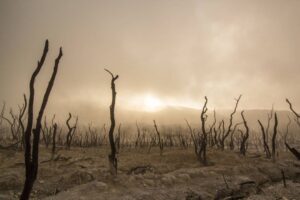Unveiling the Harsh Realities: Consequences of Climate Change
Published by Borderless Media

Climate change is no longer a distant threat but a reality that is already reshaping our world. From melting glaciers to intensifying hurricanes, the consequences of climate change are increasingly evident. In this article, we’ll delve into some of the most impactful consequences of climate change and explore how they are affecting our environment, communities, and future generations.
Rising Sea Levels and Coastal Erosion
One of the most visually striking consequences of climate change is the rising sea levels. As global temperatures increase, polar ice melts, causing seawater to expand. This phenomenon threatens coastal communities around the world, leading to erosion, saltwater intrusion into freshwater sources, and the displacement of millions of people from their homes.
Extreme Weather Events
Climate change intensifies the frequency and severity of extreme weather events. Hurricanes, droughts, floods, and heatwaves are becoming more frequent and intense, wreaking havoc on communities, infrastructure, and economies. These events disrupt livelihoods, displace populations, and strain resources for disaster response and recovery.

Disruption of Ecosystems and Biodiversity
Rising temperatures and changing weather patterns disrupt ecosystems and endanger plant and animal species. Coral reefs, often referred to as the “rainforests of the sea,” are dying due to coral bleaching caused by warmer ocean temperatures. This loss of biodiversity can have cascading effects, affecting food chains, ecosystem services, and the stability of ecosystems.
Agriculture and Food Security
Climate change poses a significant threat to global food security. Altered precipitation patterns, prolonged droughts, and increased pest infestations can diminish crop yields and compromise livestock health. Small-scale farmers and vulnerable communities are particularly at risk, facing food shortages and malnutrition as a result.
Health Risks
Climate change exacerbates health risks by promoting the spread of diseases. Warmer temperatures can lead to the proliferation of disease-carrying vectors like mosquitoes. Heatwaves can cause heat-related illnesses and exacerbate existing health conditions. Additionally, the displacement of communities due to climate-related events increases the risk of disease transmission in crowded shelters.
Economic Impacts
The consequences of climate change have far-reaching economic implications. Damage to infrastructure, decreased agricultural productivity, and the costs of responding to disasters strain economies. Businesses that rely on stable climate conditions, such as agriculture, tourism, and insurance, are particularly vulnerable.

Loss of Livelihoods
Communities dependent on natural resources like fishing, forestry, and agriculture often face the brunt of climate change consequences. As resources dwindle due to environmental changes, livelihoods are threatened, leading to increased poverty and migration.
Conclusion
The consequences of climate change are a stark reminder of the urgent need for collective action. Addressing these challenges requires global cooperation, innovative solutions, and a commitment to sustainable practices. While the consequences are sobering, there is still hope to mitigate the worst impacts of climate change by transitioning to renewable energy, implementing sustainable land use, and advocating for policies that prioritize the well-being of our planet and future generations. As individuals, communities, and nations, we have the power to make a difference and create a more resilient and sustainable world.


